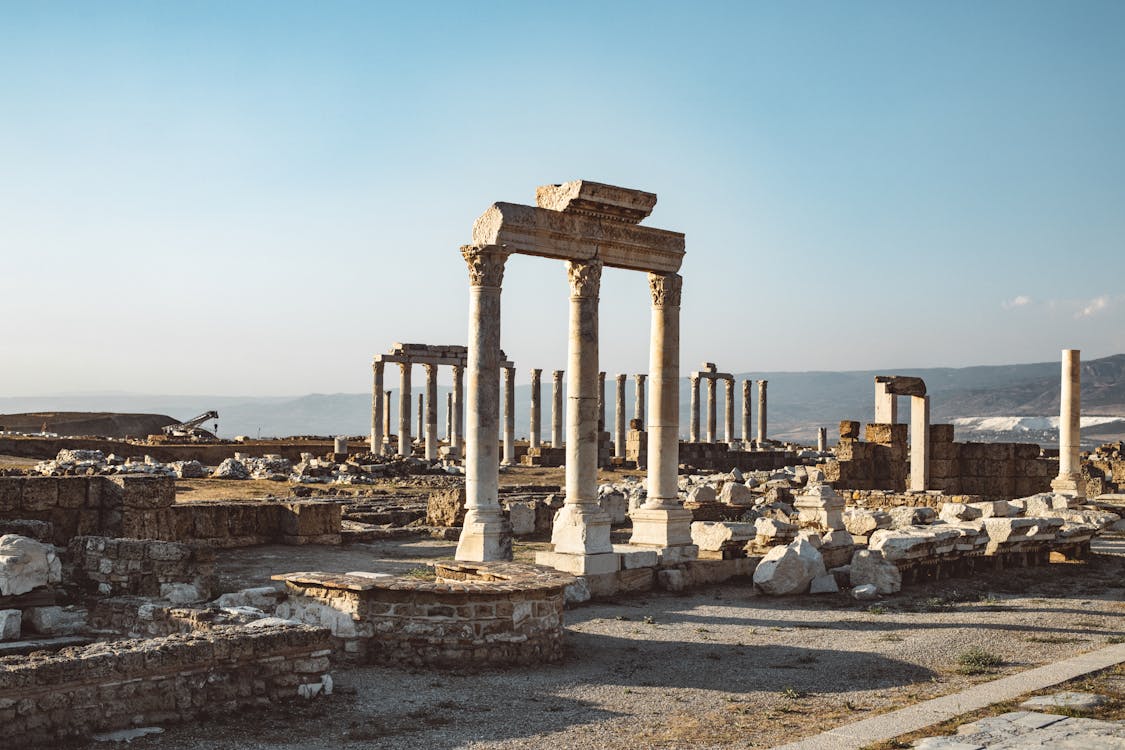If you’re thinking about visiting Greece, you’re not alone! This beautiful country is a popular tourist destination for good reason – its stunning scenery, delicious food, and rich history make it a perfect place to visit. But if you’ve never been before, there are probably quite a few things you want to know before you go. In this article, we’ll answer some of the most common questions people have about traveling to Greece.

The weather in Greece: Everything you need to know
Greece has a temperate climate, with average temperatures ranging from 18-25 degrees Celsius. rainfall is relatively low, averaging around 600mm per year. However, it can be quite variable, with some years seeing very little rain, and others seeing heavy rainfall. Snow is also relatively rare, although it does fall in the mountains.
The most stable weather in Greece is usually between April and October. Outside of these months, there can be extreme weather conditions, including high winds and heavy rains. Nevertheless, Greece is a beautiful country to visit at any time of year.
Summer in Greece
Greece is a wonderful place to spend the summer. With its sandy beaches, clear blue waters and sunny skies, it’s no wonder that so many people flock to the country every year. But Greece is more than just a beach destination.
The country has a rich history and culture, and there are plenty of things to see and do away from the beach. The summer months are the busiest time of year for tourism in Greece.
Many people travel to Greece to enjoy the warm weather and the beaches. The Greece weather in August is about 27 degrees Celsius. The water temperature is also very pleasant in the summer months, averaging about 25 degrees Celsius. Greece is a great place to visit if you are looking for a sunny and relaxing vacation.
Spring in Greece
The weather in Greece during spring is very pleasant, with average temperatures of 18-25 degrees Celsius. This is a great time to visit if you want to avoid the crowds of summer tourists and enjoy the country’s beautiful scenery.
The climate in Greece in April is generally pleasant, with temperatures ranging from 18 to 22 degrees Celsius. Rain is also rare during this month, making it an ideal opportunity to visit if you want to enjoy some sunshine.

The best time of the year to visit Greece
Greece is a country with a rich history and culture, and there is no bad time to visit. However, the best time to visit Greece is in the springtime. The weather is mild, and the flowers are in bloom. The days are getting longer, and there is a sense of possibility in the air.
Athens is especially beautiful in the springtime, as the city comes to life after a long winter. If you can’t make it to Greece in the spring, autumn is also a wonderful time to visit. The temperatures are cooler, making it ideal for exploring ancient ruins and hiking in the mountains. Ultimately, no matter when you visit Greece, you’re sure to have a memorable experience.
If you’re looking for the perfect beach vacation, the best time to visit Greece is from late May to early October. During this period, the weather is warm and sunny, making it ideal for swimming, sunbathing, and exploring the stunning coastline.
How much money you should budget for a trip to Greece
It is important to plan your budget carefully to avoid any financial surprises. If someone was to visit Greece, a trip for two people for one week would cost an estimated $2000.
This includes the cost of flights, accommodation, food, and activities. This is just a rough estimate and does not include spending money or souvenirs.
To break it down, the average cost of a flight from the United States to Greece is $700. The average price of accommodation in Greece is $80 per night. For food, expect to spend around $30 per day per person.
And finally, activities will depend on what you’re interested in but budget at least $50 per day for things like entrance fees and tours.
Of course, you can spend more or less depending on your travel style but this should give you a general idea of how much a trip to Greece would cost.
Some must-see attractions in Greece


How many days in Greece is enough
Trying to figure out how many days you need in Greece can be tough. After all, there’s so much history and culture to explore, not to mention the stunning scenery.
However, with a little planning, it is possible to get a sense of what you can realistically see and do in a given amount of time.
For instance, if you only have a few days, you might want to focus your visit on Athens and the Acropolis. Or, if you have a week or more, you could consider adding on a side trip to one of the Greek islands.
In any case, it’s important to remember that there is no perfect formula for how to spend your time in Greece. The best approach is simply to sit down and map out your priorities.
Tips for staying safe while traveling in Greece
Some general tips for staying safe while traveling in Greece include being aware of your surroundings, not carrying large amounts of cash, and avoiding deserted areas after dark.
It is also a good idea to keep copies of important documents like your passport and travel insurance in case you lose them.
If you are renting a car, be sure to drive defensively and obey all traffic laws. And finally, make sure you have comprehensive travel insurance that will cover you in case of an emergency.
By following these simple safety tips, you can help ensure that your trip to Greece is enjoyable and incident-free.

What you should know about Greek culture before you visit
Greek culture is one of the oldest in the world, with a rich history that has been passed down through the generations.
If you’re planning a trip to Greece, there are a few things you should know about the local culture. Greeks are known for their hospitality, and visitors are often treated like family.
The country has a strong focus on food and wine, and mealtimes are often leisurely affairs. When it comes to religion, Greece is predominantly Orthodox Christian, and church attendance is still high.
However, Greeks are also very tolerant of other faiths, and you’ll find many mosques and synagogues throughout the country.

Common scams to watch out for in Greece
There are a few common scams that you should be aware of when traveling to Greece. One is the fake taxis, which will often overcharge you for your ride.
Another is the “free” bracelet scam, where someone will offer to put a bracelet on your wrist and then demand money for it. There are also a few scams involving ATMs, so be sure to use only trustworthy machines in well-lit areas.
Finally, beware of pickpockets, especially in crowded areas like markets and tourist attractions. If you keep these dangers in mind, you can help avoid becoming a victim of a scam while enjoying your trip to Greece.
Special considerations you need to take into account when packing for Greece
First, the weather in Greece can be quite variable, so be sure to pack both light and heavy clothing. Second, Greeks tend to dress more formally than Americans, so it’s a good idea to pack at least one nice outfit.
Third, many of the attractions in Greece are located outdoors, so comfortable walking shoes are a must. Finally, don’t forget to pack your sunscreen! Greece is known for its sunny weather, and you’ll want to be protected from the sun’s rays.
With these things in mind, you’re sure to have a wonderful time on your trip to Greece.

How to dress when visiting Greece
When visiting Greece, it is important to dress respectfully. This means avoiding revealing clothing, such as short skirts and tank tops. It is also a good idea to avoid wearing anything with offensive language or images.
Bright colors and patterns are common in Greek clothing, so you may want to consider incorporating these into your outfit.
Comfortable shoes are also a must, as you will likely be doing a lot of walking when exploring Greece. By following these guidelines, you can ensure that you have a pleasant and respectful visit to this amazing country.

Health precautions when visiting Greece
When traveling to Greece, it is important to take some basic health precautions. Be sure to drink only bottled water, as tap water is not safe to drink.
Avoid ice cubes in drinks, and peel fruits and vegetables before eating them. It is also advisable to avoid uncooked meat and fish. Hepatitis A and B are common in Greece, so be sure to get vaccinated before your trip.
If you are visiting the beach, be aware of the risk of jellyfish stings. Finally, make sure you have comprehensive travel insurance that covers medical expenses. By following these simple tips, you can enjoy a healthy and trouble-free vacation in Greece.

Where to stay in Greece
There are many options available, from hotels and apartments to villas and even campsites. The best place to stay will depend on your budget, preference, and location.
If you want to be close to the action, then Athens is a perfect choice. For those who prefer a more relaxed pace, the island of Crete offers plenty of opportunities for exploring, relaxing, and enjoying the Mediterranean sun.
Are you ready to explore some of the most beautiful and historically significant sites in Greece? If so, we recommend planning your trip soon. With its stunning landscapes, delicious food, and rich culture, Greece is a destination that should not be missed. We hope this post has inspired you to visit this amazing country and experience all that it has to offer. What are you waiting for? Start planning your Greek vacation today!